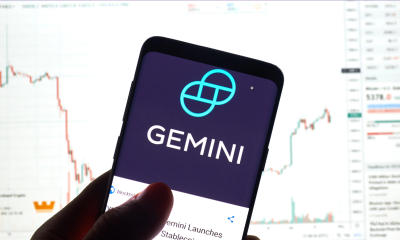Regulation
Former Digitex Futures Exchange CEO Pleads Guilty of Bypassing US Banking Law

Adam Todd, the founder and ex-CEO of Digitex Futures Exchange, has pleaded guilty to not implementing mandatory Anti-Money Laundering (AML) measures as required under the Bank Secrecy Act. The plea was accepted in a federal court of the Southern District of Florida, and on May 7, the U.S. Attorney’s Office announced the occurrence. Todd’s admission of his position mistake becomes a major compliance failure point in the cryptocurrency exchange sector.
These allegations show Todd’s active role in the operation of an unregulated futures trading platform servicing U.S. customers from 2018 to 2022 without the required AML and Know Your Customer (KYC) schemes. This is essential for halting illicit financial activities. The plea of guilty by Todd could result in a five-year jail term and a fine of $250,000, thus demonstrating the harsh penalties for such violations.
Ex-Digitex Futures Exchange CEO Pleads Guilty to AML Failures
Todd’s case is an industry-wide problem, just like the previous legal issues of former Binance CEO Changpeng Zhao (CZ). Zhao pleaded guilty in November 2023 and, in April, received a four-month prison sentence. Cases such as these illustrate a heightened inspection in the crypto industry, with U.S. regulators toughen the enforcement to prevent illegal activities. Todd has not as yet been sentenced, further perpetuating the story of regulatory oversight in the fintech space.
Although Todd resigned as CEO in October 2022, he has been actively involved in the industry since February 2023 as lead developer for Digitex Games. His continued involvement in the tech world in spite of legal battles is a classic example of resilience common among tech entrepreneurs struggling with regulatory barriers. The industry’s legal responses to these legal challenges could set future compliance standards for such platforms.
KYC Removal Intensifies Digitex CEO’s Legal Issues
The plea is the latest in a sequence of regulatory measures against Todd and Digitex. These include the 2022 lawsuit filed by the U.S. Commodity Futures Trading Commission (CFTC) that ended in a 2023 judgment requiring Todd and his company to pay $16 million in penalties and disgorgement. This result is not only a financial lesson of regulatory non-compliance but also an indication to other companies about the need to follow U.S. laws.
In 2020, the controversy became more intense when Todd declared that all KYC checks should be wiped out after a big data breach that exposed user information. The act, though aimed at preserving user privacy, flouted regulatory requirements and hence added to his legal problems.
Read Also: Robinhood to Report Big Quarterly Earnings Report, Joins Crypto Fight Against SEC
The presented content may include the personal opinion of the author and is subject to market condition. Do your market research before investing in cryptocurrencies. The author or the publication does not hold any responsibility for your personal financial loss.
Regulation
Japan Set To Classify Cryptocurrencies As Financial Products, Here’s All

Cryptocurrency investors in Japan are bracing for impact following a plan to reclassify digital assets as financial products. While the plan has elicited excitement from cryptocurrency enthusiasts in the Far East, the ambitious plan will have to scale several legislative hurdles.
Japan Targets Reclassification Of Cryptocurrencies As Financial Products
According to a report by Nikkei, Japan’s Financial Services Agency (FSA) is inching toward classifying cryptocurrencies as financial products. Per the report, the FSA intends to achieve the reclassification via an amendment to the Financial Instruments and Exchange Act.
Currently, digital assets in Japan are considered crypto assets conferred with property rights and seen as payment means. Under the FSA’s plans, cryptocurrencies in Japan will be treated as financial products in the same manner as traditional financial products.
The FSA says it will adopt a slow and steady approach toward the reclassification, carrying out “a private expert study group” to test the waters. If everything goes according to plan, the FSA will submit the amended bill to Parliament in early 2026.
The classification of cryptocurrencies as financial products will have far-reaching consequences for the local ecosystem. Experts say treating cryptocurrencies as financial products will bring Japan closer to a crypto ETF launch amid a changing regulatory landscape.
Furthermore, the move may lower current cryptocurrency taxation for local investors since existing capital market rules will apply to the asset class.
A Fresh Bill For Crypto Insider Trading Is Underway
Apart from the reclassification, the FSA disclosed plans for new legislation against insider trading. The move flows treating cryptocurrencies as financial products and will strengthen existing investor protection rules.
“It is a direction to establish a new insider trading regulation that prohibits trading based on unpublished internal information,” said the FSA. “We will develop laws to prevent unfair transactions.”
However, Japan’s cryptocurrency scene is heating up to a boil, driven by local and international players. Last week, stablecoin issuer Circle secured approval from the FSA for USDC with top exchanges set to list the stablecoin.
Japan’s Metaplanet has tapped Eric Trump to join its Strategic Board of Advisors as it continues to load up Bitcoin.
Disclaimer: The presented content may include the personal opinion of the author and is subject to market condition. Do your market research before investing in cryptocurrencies. The author or the publication does not hold any responsibility for your personal financial loss.
Regulation
Kentucky Governor Signs Off On ‘Bitcoin Rights’ Bill, Strengthening Crypto Protections


In what is being dubbed a major development in the crypto regulation space, the Governor of the US state of Kentucky, Andy Beshear, has signed the ‘Bitcoin Rights’ bill into law. The law promises to safeguard protections for Bitcoin (BTC) users.
Bitcoin Rights Bill Comes Into Effect
Crypto regulations continue to evolve under pro-crypto US President Donald Trump’s administration. In the latest development, Kentucky has become the newest state to enshrine protections for digital asset users.
In an X post published on March 24, crypto advocacy group Satoshi Action Fund announced that Governor Beshear had signed the much-anticipated Bitcoin Rights bill into law. The post stated:
The right to self-custody, run a node, and use of digital assets is now protected for millions of Americans without fear of discrimination.
The bill was first introduced to the Kentucky House by Rep. Adam Bowling on February 19. According to the bill’s description, it seeks to safeguard users’ rights to use digital assets and self-custody wallets. Additionally, it aims to prohibit local zoning changes that discriminate against crypto mining operations.
The legislation outlines guidelines for running a digital asset node and excludes digital asset mining from money transmitter license requirements. It also clarifies that crypto mining or staking is not considered an offer or sale of securities.
On February 28, the bill passed Kentucky’s House of Representatives with a unanimous vote of all 91 representatives in favor. It later passed the Kentucky Senate on March 13, receiving backing from all 37 senators.
Kentucky’s proactive stance toward cryptocurrencies isn’t new. Earlier this year, the state became the 16th US state to introduce legislation seeking to create a Bitcoin strategic reserve.
Meanwhile, neighboring state Arizona is also joining the crypto movement. A recent X post by Bitcoin Laws revealed that Arizona’s House Rules Committee has passed two Bitcoin reserve bills — SB1373 and SB1025. These bills will now head to a full floor vote.
Renewed Optimism Under Trump Administration
Following Trump’s victory in the November presidential election, cryptocurrency regulations in the US are evolving rapidly, with many states introducing legislation aimed at strengthening their digital asset ecosystems and attracting crypto businesses.
Positive changes in crypto regulations are encouraging industry businesses to expand. For instance, leading crypto trading platform Coinbase recently announced plans to hire 1,000 employees in the US.
The Trump administration has also witnessed several lawsuits being dropped against major crypto entities, including Kraken, Coinbase, Gemini, and others. At press time, Bitcoin trades at $87,399, down 0.2% in the past 24 hours.

Featured Image from Unsplash.com, chart from TradingView.com

Editorial Process for bitcoinist is centered on delivering thoroughly researched, accurate, and unbiased content. We uphold strict sourcing standards, and each page undergoes diligent review by our team of top technology experts and seasoned editors. This process ensures the integrity, relevance, and value of our content for our readers.
Regulation
US SEC Drops Charges Against Hawk Tuah Girl Hailey Welch

Hawk Tuah girl Hailey Welch, known for her association with the controversial $HAWK token, has been cleared of any wrongdoing after a lengthy investigation by the U.S. Securities and Exchange Commission (SEC). The SEC has decided not to press charges against Welch in connection with the rapid rise and subsequent collapse of the meme-based cryptocurrency.
US SEC Investigation Into Hawk Tuah Girl Concludes Without Charges
The SEC had launched an investigation into the $HAWK token after its dramatic price drop. The token, which was linked to Welch’s viral persona, initially saw a market cap surge to $490 million before crashing by over 90%. Investors who were impacted by the crash filed a lawsuit against those behind the project, alleging that the coin had been promoted and sold without proper registration.
Hawk Tuah girl Hailey Welch, who cooperated fully with the investigation, expressed relief after the SEC’s decision. “For the past few months, I’ve been cooperating with all the authorities and attorneys, and finally, that work is complete,” Welch told TMZ.
Her attorney, James Sallah, confirmed that the SEC had closed the case without any findings against her, adding that there would be no monetary sanctions or restrictions on Welch’s future involvement in cryptocurrency or securities.
This Is A Developing News, Please Check Back For More
Disclaimer: The presented content may include the personal opinion of the author and is subject to market condition. Do your market research before investing in cryptocurrencies. The author or the publication does not hold any responsibility for your personal financial loss.
-

 Ethereum23 hours ago
Ethereum23 hours agoEthereum Analyst Eyes $1,200-$1,300 Level As Potential Acquisition Zone – Details
-

 Ethereum22 hours ago
Ethereum22 hours agoWhales Accumulate 470,000 Ethereum In One Week – Bullish Momentum Ahead?
-

 Bitcoin23 hours ago
Bitcoin23 hours agoGold Keeps Outperforming Bitcoin Amid Trump’s Trade War Chaos
-

 Regulation20 hours ago
Regulation20 hours agoJapan Set To Classify Cryptocurrencies As Financial Products, Here’s All
-

 Market19 hours ago
Market19 hours agoTop 3 Made in USA Coins to Watch This Week
-

 Market24 hours ago
Market24 hours agoBitcoin (BTC) Whales Accumulate as Market Faces Uncertainty
-

 Altcoin23 hours ago
Altcoin23 hours agoAnalyst Reveals Why The XRP Price Can Hit ATH In The Next 90 To 120 Days
-

 Market22 hours ago
Market22 hours ago3 Token Unlocks for April: Parcl, deBridge, Scroll























✓ Share: